Literature Review: Electronic Health Records and Patient Privacy
VerifiedAdded on 2022/07/29
|13
|3811
|37
Literature Review
AI Summary
This literature review examines the impact of Electronic Health Records (EHR) on patient privacy and confidentiality. The paper explores the evolution of EHR, its advantages such as improved quality of care and accessibility, and disadvantages including potential privacy breaches. It highlights the concerns of patients and physicians regarding data security and the ethical implications of wide information sharing. The review analyzes various studies and literature, including the history of EHR in the United States and the role of government acts like HIPAA and HITECH. The discussion emphasizes the importance of addressing privacy issues to ensure public confidence in EHR systems, particularly in the context of nursing and healthcare. The review concludes by underscoring the need for safeguards to protect sensitive patient information and uphold ethical responsibilities in the digital age.
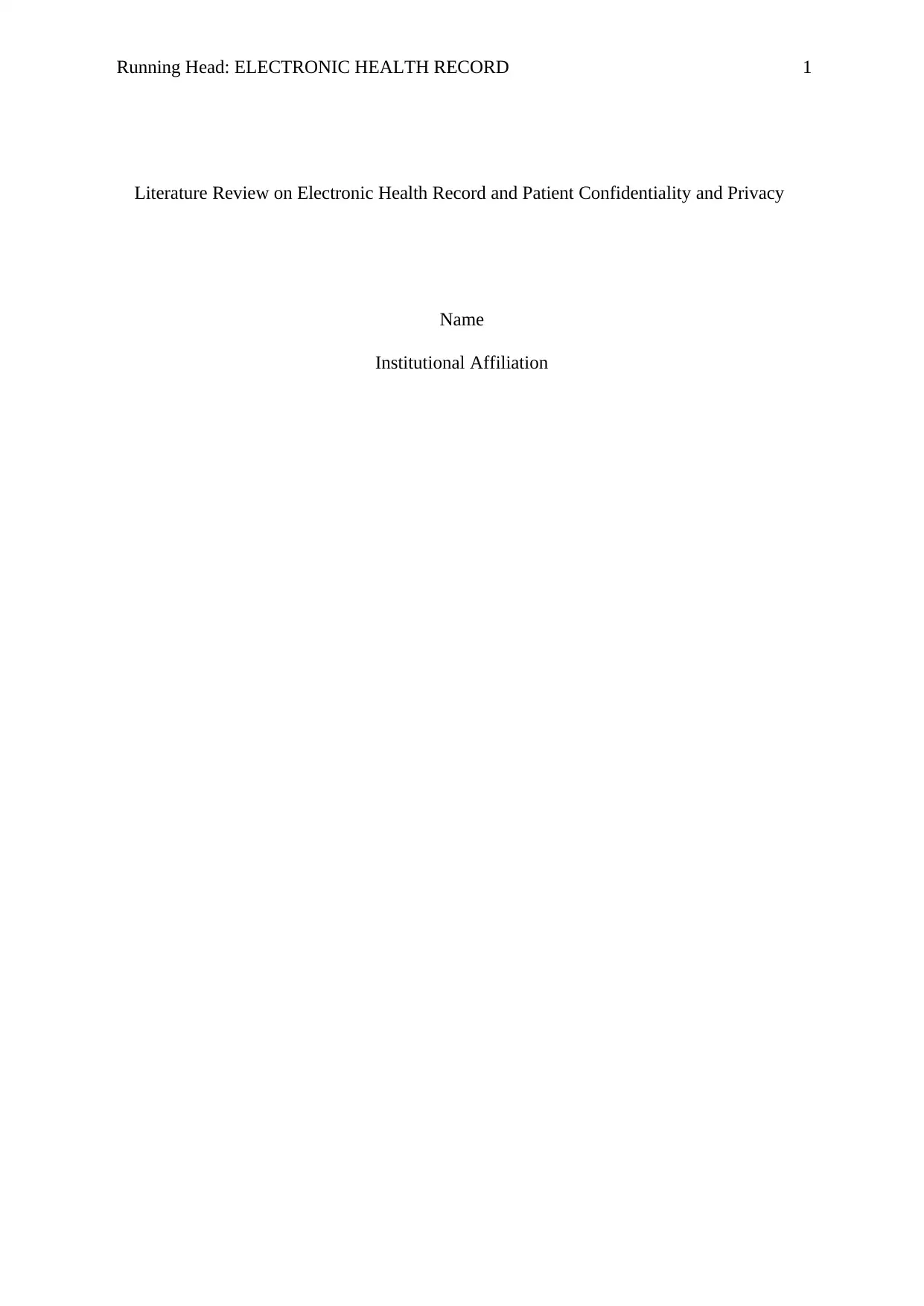
Running Head: ELECTRONIC HEALTH RECORD 1
Literature Review on Electronic Health Record and Patient Confidentiality and Privacy
Name
Institutional Affiliation
Literature Review on Electronic Health Record and Patient Confidentiality and Privacy
Name
Institutional Affiliation
Paraphrase This Document
Need a fresh take? Get an instant paraphrase of this document with our AI Paraphraser
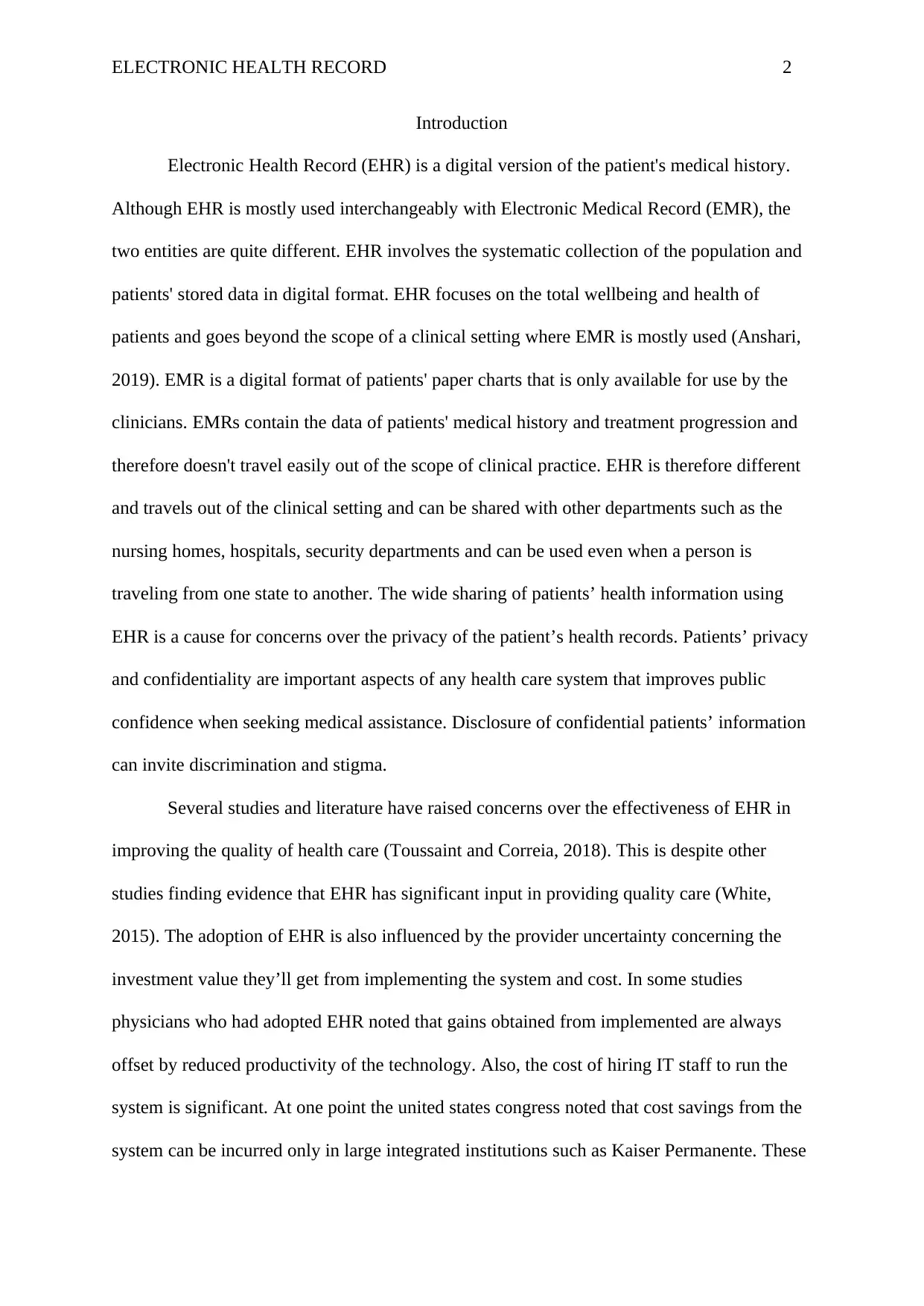
ELECTRONIC HEALTH RECORD 2
Introduction
Electronic Health Record (EHR) is a digital version of the patient's medical history.
Although EHR is mostly used interchangeably with Electronic Medical Record (EMR), the
two entities are quite different. EHR involves the systematic collection of the population and
patients' stored data in digital format. EHR focuses on the total wellbeing and health of
patients and goes beyond the scope of a clinical setting where EMR is mostly used (Anshari,
2019). EMR is a digital format of patients' paper charts that is only available for use by the
clinicians. EMRs contain the data of patients' medical history and treatment progression and
therefore doesn't travel easily out of the scope of clinical practice. EHR is therefore different
and travels out of the clinical setting and can be shared with other departments such as the
nursing homes, hospitals, security departments and can be used even when a person is
traveling from one state to another. The wide sharing of patients’ health information using
EHR is a cause for concerns over the privacy of the patient’s health records. Patients’ privacy
and confidentiality are important aspects of any health care system that improves public
confidence when seeking medical assistance. Disclosure of confidential patients’ information
can invite discrimination and stigma.
Several studies and literature have raised concerns over the effectiveness of EHR in
improving the quality of health care (Toussaint and Correia, 2018). This is despite other
studies finding evidence that EHR has significant input in providing quality care (White,
2015). The adoption of EHR is also influenced by the provider uncertainty concerning the
investment value they’ll get from implementing the system and cost. In some studies
physicians who had adopted EHR noted that gains obtained from implemented are always
offset by reduced productivity of the technology. Also, the cost of hiring IT staff to run the
system is significant. At one point the united states congress noted that cost savings from the
system can be incurred only in large integrated institutions such as Kaiser Permanente. These
Introduction
Electronic Health Record (EHR) is a digital version of the patient's medical history.
Although EHR is mostly used interchangeably with Electronic Medical Record (EMR), the
two entities are quite different. EHR involves the systematic collection of the population and
patients' stored data in digital format. EHR focuses on the total wellbeing and health of
patients and goes beyond the scope of a clinical setting where EMR is mostly used (Anshari,
2019). EMR is a digital format of patients' paper charts that is only available for use by the
clinicians. EMRs contain the data of patients' medical history and treatment progression and
therefore doesn't travel easily out of the scope of clinical practice. EHR is therefore different
and travels out of the clinical setting and can be shared with other departments such as the
nursing homes, hospitals, security departments and can be used even when a person is
traveling from one state to another. The wide sharing of patients’ health information using
EHR is a cause for concerns over the privacy of the patient’s health records. Patients’ privacy
and confidentiality are important aspects of any health care system that improves public
confidence when seeking medical assistance. Disclosure of confidential patients’ information
can invite discrimination and stigma.
Several studies and literature have raised concerns over the effectiveness of EHR in
improving the quality of health care (Toussaint and Correia, 2018). This is despite other
studies finding evidence that EHR has significant input in providing quality care (White,
2015). The adoption of EHR is also influenced by the provider uncertainty concerning the
investment value they’ll get from implementing the system and cost. In some studies
physicians who had adopted EHR noted that gains obtained from implemented are always
offset by reduced productivity of the technology. Also, the cost of hiring IT staff to run the
system is significant. At one point the united states congress noted that cost savings from the
system can be incurred only in large integrated institutions such as Kaiser Permanente. These
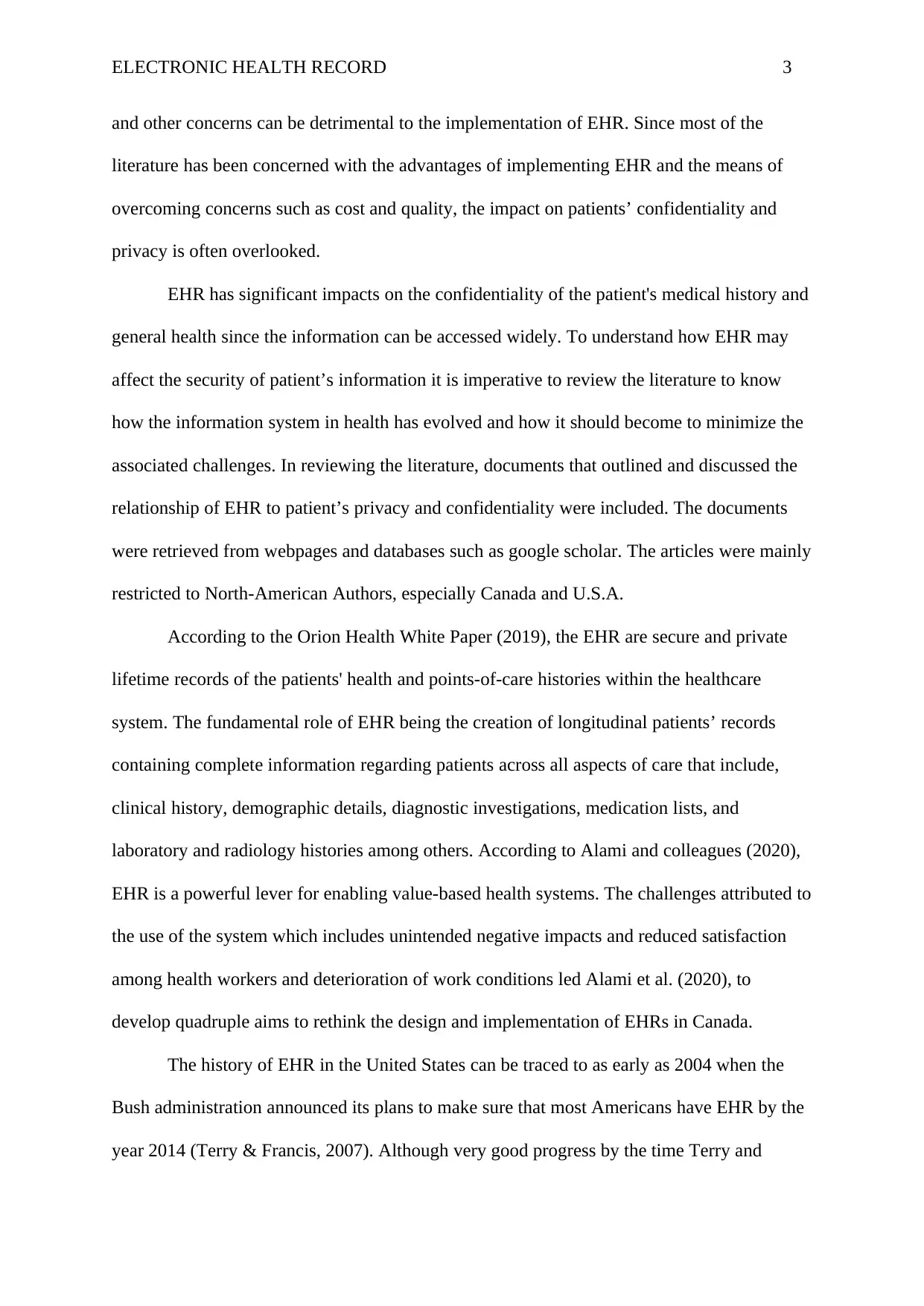
ELECTRONIC HEALTH RECORD 3
and other concerns can be detrimental to the implementation of EHR. Since most of the
literature has been concerned with the advantages of implementing EHR and the means of
overcoming concerns such as cost and quality, the impact on patients’ confidentiality and
privacy is often overlooked.
EHR has significant impacts on the confidentiality of the patient's medical history and
general health since the information can be accessed widely. To understand how EHR may
affect the security of patient’s information it is imperative to review the literature to know
how the information system in health has evolved and how it should become to minimize the
associated challenges. In reviewing the literature, documents that outlined and discussed the
relationship of EHR to patient’s privacy and confidentiality were included. The documents
were retrieved from webpages and databases such as google scholar. The articles were mainly
restricted to North-American Authors, especially Canada and U.S.A.
According to the Orion Health White Paper (2019), the EHR are secure and private
lifetime records of the patients' health and points-of-care histories within the healthcare
system. The fundamental role of EHR being the creation of longitudinal patients’ records
containing complete information regarding patients across all aspects of care that include,
clinical history, demographic details, diagnostic investigations, medication lists, and
laboratory and radiology histories among others. According to Alami and colleagues (2020),
EHR is a powerful lever for enabling value-based health systems. The challenges attributed to
the use of the system which includes unintended negative impacts and reduced satisfaction
among health workers and deterioration of work conditions led Alami et al. (2020), to
develop quadruple aims to rethink the design and implementation of EHRs in Canada.
The history of EHR in the United States can be traced to as early as 2004 when the
Bush administration announced its plans to make sure that most Americans have EHR by the
year 2014 (Terry & Francis, 2007). Although very good progress by the time Terry and
and other concerns can be detrimental to the implementation of EHR. Since most of the
literature has been concerned with the advantages of implementing EHR and the means of
overcoming concerns such as cost and quality, the impact on patients’ confidentiality and
privacy is often overlooked.
EHR has significant impacts on the confidentiality of the patient's medical history and
general health since the information can be accessed widely. To understand how EHR may
affect the security of patient’s information it is imperative to review the literature to know
how the information system in health has evolved and how it should become to minimize the
associated challenges. In reviewing the literature, documents that outlined and discussed the
relationship of EHR to patient’s privacy and confidentiality were included. The documents
were retrieved from webpages and databases such as google scholar. The articles were mainly
restricted to North-American Authors, especially Canada and U.S.A.
According to the Orion Health White Paper (2019), the EHR are secure and private
lifetime records of the patients' health and points-of-care histories within the healthcare
system. The fundamental role of EHR being the creation of longitudinal patients’ records
containing complete information regarding patients across all aspects of care that include,
clinical history, demographic details, diagnostic investigations, medication lists, and
laboratory and radiology histories among others. According to Alami and colleagues (2020),
EHR is a powerful lever for enabling value-based health systems. The challenges attributed to
the use of the system which includes unintended negative impacts and reduced satisfaction
among health workers and deterioration of work conditions led Alami et al. (2020), to
develop quadruple aims to rethink the design and implementation of EHRs in Canada.
The history of EHR in the United States can be traced to as early as 2004 when the
Bush administration announced its plans to make sure that most Americans have EHR by the
year 2014 (Terry & Francis, 2007). Although very good progress by the time Terry and
⊘ This is a preview!⊘
Do you want full access?
Subscribe today to unlock all pages.

Trusted by 1+ million students worldwide
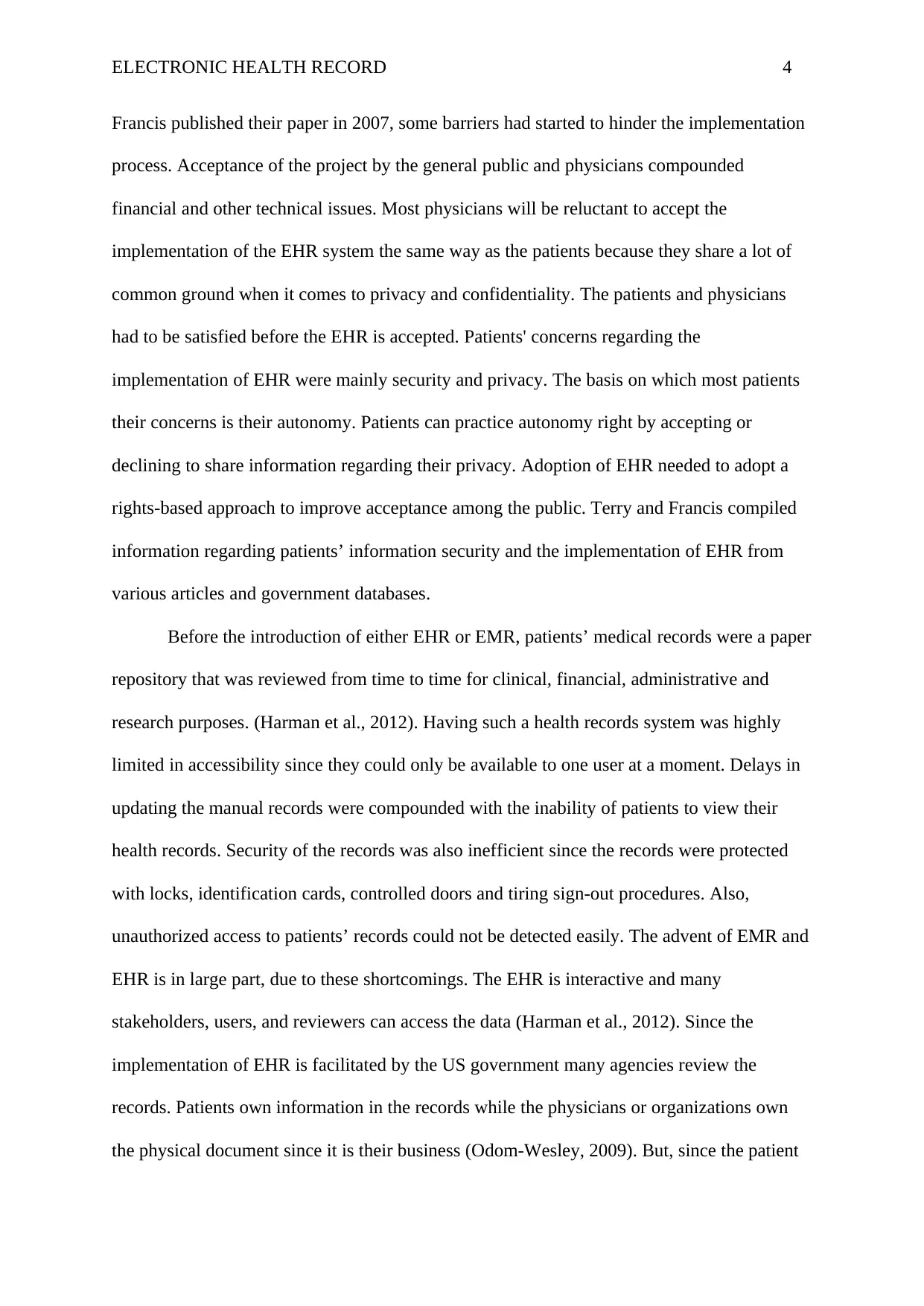
ELECTRONIC HEALTH RECORD 4
Francis published their paper in 2007, some barriers had started to hinder the implementation
process. Acceptance of the project by the general public and physicians compounded
financial and other technical issues. Most physicians will be reluctant to accept the
implementation of the EHR system the same way as the patients because they share a lot of
common ground when it comes to privacy and confidentiality. The patients and physicians
had to be satisfied before the EHR is accepted. Patients' concerns regarding the
implementation of EHR were mainly security and privacy. The basis on which most patients
their concerns is their autonomy. Patients can practice autonomy right by accepting or
declining to share information regarding their privacy. Adoption of EHR needed to adopt a
rights-based approach to improve acceptance among the public. Terry and Francis compiled
information regarding patients’ information security and the implementation of EHR from
various articles and government databases.
Before the introduction of either EHR or EMR, patients’ medical records were a paper
repository that was reviewed from time to time for clinical, financial, administrative and
research purposes. (Harman et al., 2012). Having such a health records system was highly
limited in accessibility since they could only be available to one user at a moment. Delays in
updating the manual records were compounded with the inability of patients to view their
health records. Security of the records was also inefficient since the records were protected
with locks, identification cards, controlled doors and tiring sign-out procedures. Also,
unauthorized access to patients’ records could not be detected easily. The advent of EMR and
EHR is in large part, due to these shortcomings. The EHR is interactive and many
stakeholders, users, and reviewers can access the data (Harman et al., 2012). Since the
implementation of EHR is facilitated by the US government many agencies review the
records. Patients own information in the records while the physicians or organizations own
the physical document since it is their business (Odom-Wesley, 2009). But, since the patient
Francis published their paper in 2007, some barriers had started to hinder the implementation
process. Acceptance of the project by the general public and physicians compounded
financial and other technical issues. Most physicians will be reluctant to accept the
implementation of the EHR system the same way as the patients because they share a lot of
common ground when it comes to privacy and confidentiality. The patients and physicians
had to be satisfied before the EHR is accepted. Patients' concerns regarding the
implementation of EHR were mainly security and privacy. The basis on which most patients
their concerns is their autonomy. Patients can practice autonomy right by accepting or
declining to share information regarding their privacy. Adoption of EHR needed to adopt a
rights-based approach to improve acceptance among the public. Terry and Francis compiled
information regarding patients’ information security and the implementation of EHR from
various articles and government databases.
Before the introduction of either EHR or EMR, patients’ medical records were a paper
repository that was reviewed from time to time for clinical, financial, administrative and
research purposes. (Harman et al., 2012). Having such a health records system was highly
limited in accessibility since they could only be available to one user at a moment. Delays in
updating the manual records were compounded with the inability of patients to view their
health records. Security of the records was also inefficient since the records were protected
with locks, identification cards, controlled doors and tiring sign-out procedures. Also,
unauthorized access to patients’ records could not be detected easily. The advent of EMR and
EHR is in large part, due to these shortcomings. The EHR is interactive and many
stakeholders, users, and reviewers can access the data (Harman et al., 2012). Since the
implementation of EHR is facilitated by the US government many agencies review the
records. Patients own information in the records while the physicians or organizations own
the physical document since it is their business (Odom-Wesley, 2009). But, since the patient
Paraphrase This Document
Need a fresh take? Get an instant paraphrase of this document with our AI Paraphraser
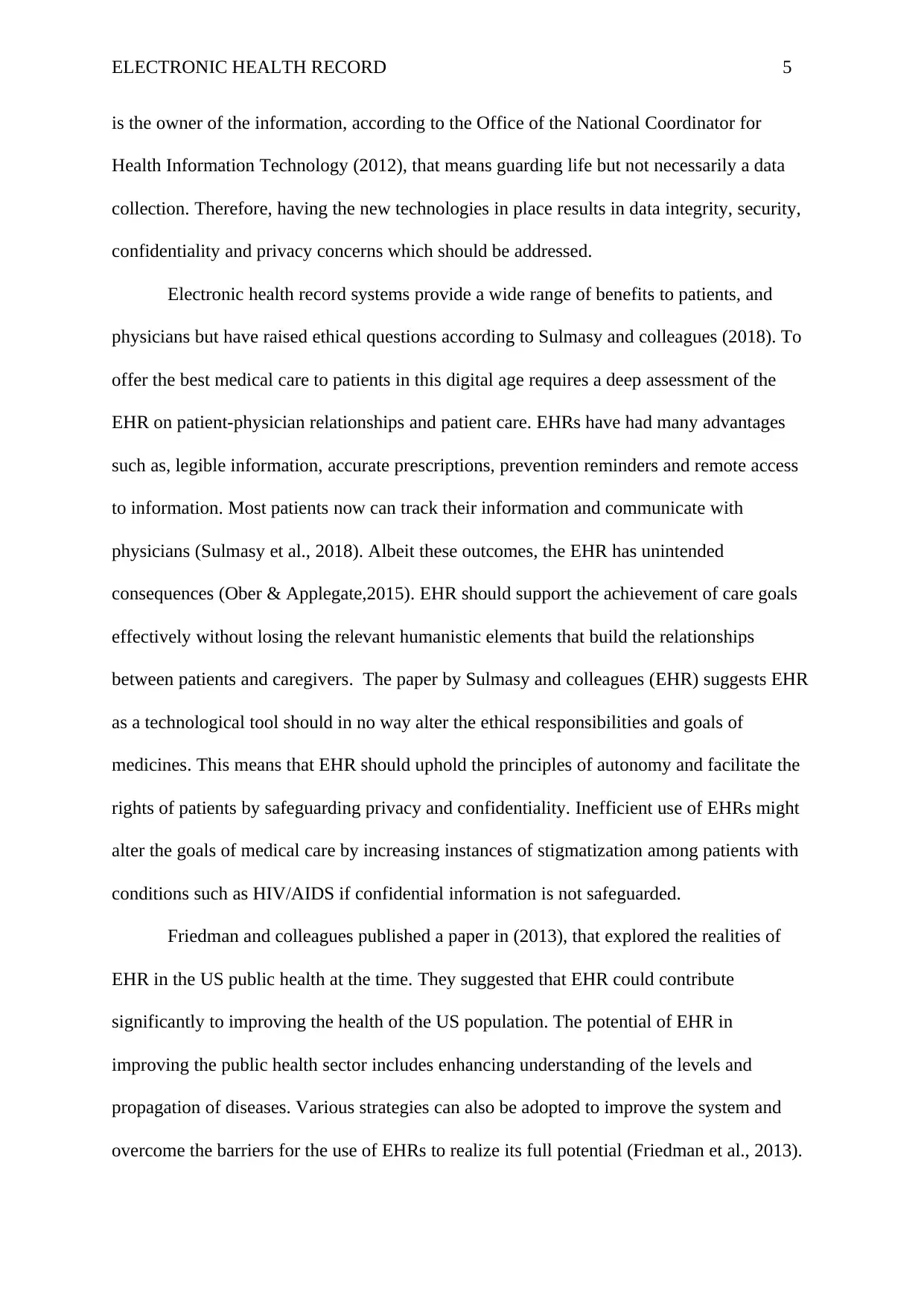
ELECTRONIC HEALTH RECORD 5
is the owner of the information, according to the Office of the National Coordinator for
Health Information Technology (2012), that means guarding life but not necessarily a data
collection. Therefore, having the new technologies in place results in data integrity, security,
confidentiality and privacy concerns which should be addressed.
Electronic health record systems provide a wide range of benefits to patients, and
physicians but have raised ethical questions according to Sulmasy and colleagues (2018). To
offer the best medical care to patients in this digital age requires a deep assessment of the
EHR on patient-physician relationships and patient care. EHRs have had many advantages
such as, legible information, accurate prescriptions, prevention reminders and remote access
to information. Most patients now can track their information and communicate with
physicians (Sulmasy et al., 2018). Albeit these outcomes, the EHR has unintended
consequences (Ober & Applegate,2015). EHR should support the achievement of care goals
effectively without losing the relevant humanistic elements that build the relationships
between patients and caregivers. The paper by Sulmasy and colleagues (EHR) suggests EHR
as a technological tool should in no way alter the ethical responsibilities and goals of
medicines. This means that EHR should uphold the principles of autonomy and facilitate the
rights of patients by safeguarding privacy and confidentiality. Inefficient use of EHRs might
alter the goals of medical care by increasing instances of stigmatization among patients with
conditions such as HIV/AIDS if confidential information is not safeguarded.
Friedman and colleagues published a paper in (2013), that explored the realities of
EHR in the US public health at the time. They suggested that EHR could contribute
significantly to improving the health of the US population. The potential of EHR in
improving the public health sector includes enhancing understanding of the levels and
propagation of diseases. Various strategies can also be adopted to improve the system and
overcome the barriers for the use of EHRs to realize its full potential (Friedman et al., 2013).
is the owner of the information, according to the Office of the National Coordinator for
Health Information Technology (2012), that means guarding life but not necessarily a data
collection. Therefore, having the new technologies in place results in data integrity, security,
confidentiality and privacy concerns which should be addressed.
Electronic health record systems provide a wide range of benefits to patients, and
physicians but have raised ethical questions according to Sulmasy and colleagues (2018). To
offer the best medical care to patients in this digital age requires a deep assessment of the
EHR on patient-physician relationships and patient care. EHRs have had many advantages
such as, legible information, accurate prescriptions, prevention reminders and remote access
to information. Most patients now can track their information and communicate with
physicians (Sulmasy et al., 2018). Albeit these outcomes, the EHR has unintended
consequences (Ober & Applegate,2015). EHR should support the achievement of care goals
effectively without losing the relevant humanistic elements that build the relationships
between patients and caregivers. The paper by Sulmasy and colleagues (EHR) suggests EHR
as a technological tool should in no way alter the ethical responsibilities and goals of
medicines. This means that EHR should uphold the principles of autonomy and facilitate the
rights of patients by safeguarding privacy and confidentiality. Inefficient use of EHRs might
alter the goals of medical care by increasing instances of stigmatization among patients with
conditions such as HIV/AIDS if confidential information is not safeguarded.
Friedman and colleagues published a paper in (2013), that explored the realities of
EHR in the US public health at the time. They suggested that EHR could contribute
significantly to improving the health of the US population. The potential of EHR in
improving the public health sector includes enhancing understanding of the levels and
propagation of diseases. Various strategies can also be adopted to improve the system and
overcome the barriers for the use of EHRs to realize its full potential (Friedman et al., 2013).
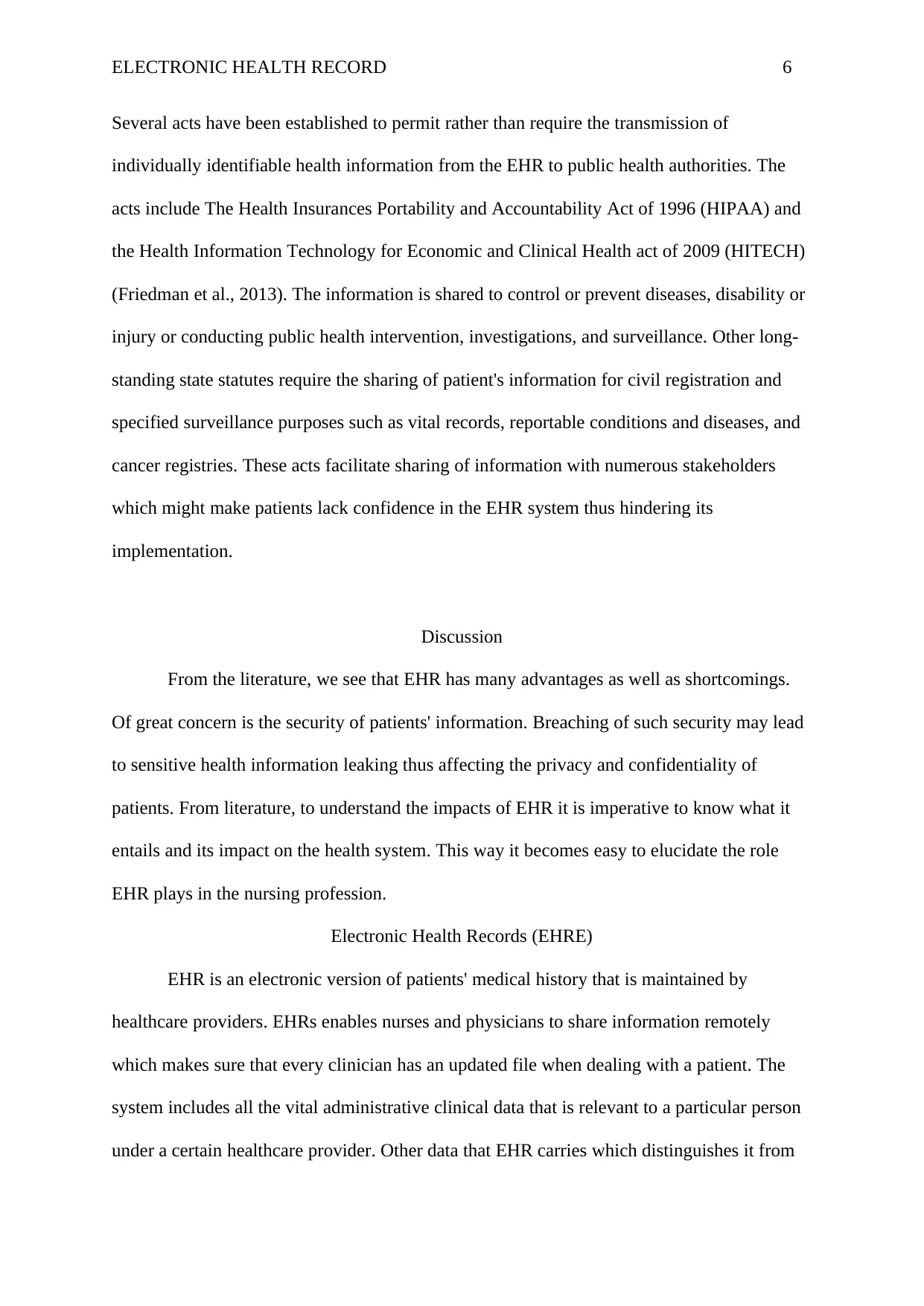
ELECTRONIC HEALTH RECORD 6
Several acts have been established to permit rather than require the transmission of
individually identifiable health information from the EHR to public health authorities. The
acts include The Health Insurances Portability and Accountability Act of 1996 (HIPAA) and
the Health Information Technology for Economic and Clinical Health act of 2009 (HITECH)
(Friedman et al., 2013). The information is shared to control or prevent diseases, disability or
injury or conducting public health intervention, investigations, and surveillance. Other long-
standing state statutes require the sharing of patient's information for civil registration and
specified surveillance purposes such as vital records, reportable conditions and diseases, and
cancer registries. These acts facilitate sharing of information with numerous stakeholders
which might make patients lack confidence in the EHR system thus hindering its
implementation.
Discussion
From the literature, we see that EHR has many advantages as well as shortcomings.
Of great concern is the security of patients' information. Breaching of such security may lead
to sensitive health information leaking thus affecting the privacy and confidentiality of
patients. From literature, to understand the impacts of EHR it is imperative to know what it
entails and its impact on the health system. This way it becomes easy to elucidate the role
EHR plays in the nursing profession.
Electronic Health Records (EHRE)
EHR is an electronic version of patients' medical history that is maintained by
healthcare providers. EHRs enables nurses and physicians to share information remotely
which makes sure that every clinician has an updated file when dealing with a patient. The
system includes all the vital administrative clinical data that is relevant to a particular person
under a certain healthcare provider. Other data that EHR carries which distinguishes it from
Several acts have been established to permit rather than require the transmission of
individually identifiable health information from the EHR to public health authorities. The
acts include The Health Insurances Portability and Accountability Act of 1996 (HIPAA) and
the Health Information Technology for Economic and Clinical Health act of 2009 (HITECH)
(Friedman et al., 2013). The information is shared to control or prevent diseases, disability or
injury or conducting public health intervention, investigations, and surveillance. Other long-
standing state statutes require the sharing of patient's information for civil registration and
specified surveillance purposes such as vital records, reportable conditions and diseases, and
cancer registries. These acts facilitate sharing of information with numerous stakeholders
which might make patients lack confidence in the EHR system thus hindering its
implementation.
Discussion
From the literature, we see that EHR has many advantages as well as shortcomings.
Of great concern is the security of patients' information. Breaching of such security may lead
to sensitive health information leaking thus affecting the privacy and confidentiality of
patients. From literature, to understand the impacts of EHR it is imperative to know what it
entails and its impact on the health system. This way it becomes easy to elucidate the role
EHR plays in the nursing profession.
Electronic Health Records (EHRE)
EHR is an electronic version of patients' medical history that is maintained by
healthcare providers. EHRs enables nurses and physicians to share information remotely
which makes sure that every clinician has an updated file when dealing with a patient. The
system includes all the vital administrative clinical data that is relevant to a particular person
under a certain healthcare provider. Other data that EHR carries which distinguishes it from
⊘ This is a preview!⊘
Do you want full access?
Subscribe today to unlock all pages.

Trusted by 1+ million students worldwide
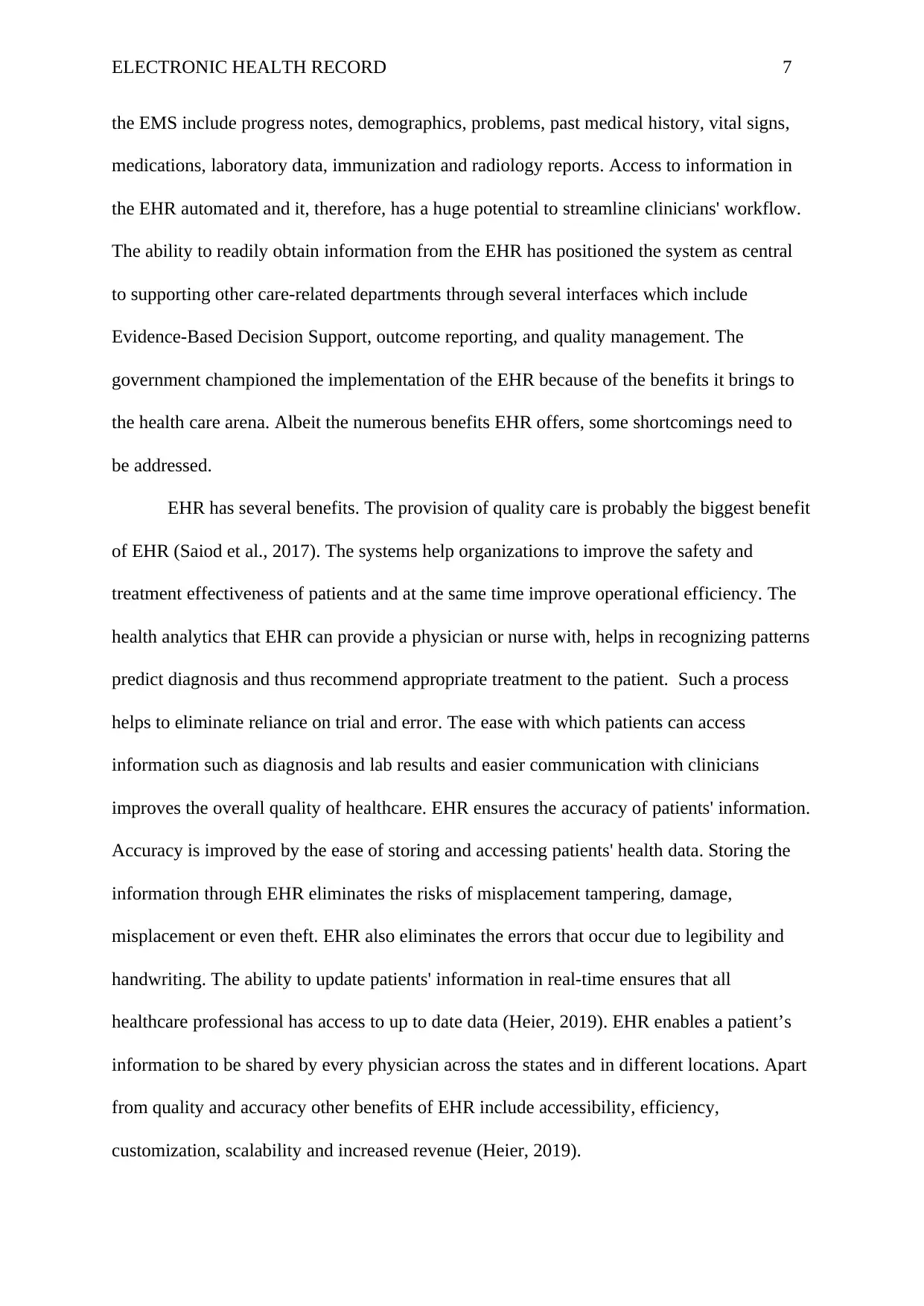
ELECTRONIC HEALTH RECORD 7
the EMS include progress notes, demographics, problems, past medical history, vital signs,
medications, laboratory data, immunization and radiology reports. Access to information in
the EHR automated and it, therefore, has a huge potential to streamline clinicians' workflow.
The ability to readily obtain information from the EHR has positioned the system as central
to supporting other care-related departments through several interfaces which include
Evidence-Based Decision Support, outcome reporting, and quality management. The
government championed the implementation of the EHR because of the benefits it brings to
the health care arena. Albeit the numerous benefits EHR offers, some shortcomings need to
be addressed.
EHR has several benefits. The provision of quality care is probably the biggest benefit
of EHR (Saiod et al., 2017). The systems help organizations to improve the safety and
treatment effectiveness of patients and at the same time improve operational efficiency. The
health analytics that EHR can provide a physician or nurse with, helps in recognizing patterns
predict diagnosis and thus recommend appropriate treatment to the patient. Such a process
helps to eliminate reliance on trial and error. The ease with which patients can access
information such as diagnosis and lab results and easier communication with clinicians
improves the overall quality of healthcare. EHR ensures the accuracy of patients' information.
Accuracy is improved by the ease of storing and accessing patients' health data. Storing the
information through EHR eliminates the risks of misplacement tampering, damage,
misplacement or even theft. EHR also eliminates the errors that occur due to legibility and
handwriting. The ability to update patients' information in real-time ensures that all
healthcare professional has access to up to date data (Heier, 2019). EHR enables a patient’s
information to be shared by every physician across the states and in different locations. Apart
from quality and accuracy other benefits of EHR include accessibility, efficiency,
customization, scalability and increased revenue (Heier, 2019).
the EMS include progress notes, demographics, problems, past medical history, vital signs,
medications, laboratory data, immunization and radiology reports. Access to information in
the EHR automated and it, therefore, has a huge potential to streamline clinicians' workflow.
The ability to readily obtain information from the EHR has positioned the system as central
to supporting other care-related departments through several interfaces which include
Evidence-Based Decision Support, outcome reporting, and quality management. The
government championed the implementation of the EHR because of the benefits it brings to
the health care arena. Albeit the numerous benefits EHR offers, some shortcomings need to
be addressed.
EHR has several benefits. The provision of quality care is probably the biggest benefit
of EHR (Saiod et al., 2017). The systems help organizations to improve the safety and
treatment effectiveness of patients and at the same time improve operational efficiency. The
health analytics that EHR can provide a physician or nurse with, helps in recognizing patterns
predict diagnosis and thus recommend appropriate treatment to the patient. Such a process
helps to eliminate reliance on trial and error. The ease with which patients can access
information such as diagnosis and lab results and easier communication with clinicians
improves the overall quality of healthcare. EHR ensures the accuracy of patients' information.
Accuracy is improved by the ease of storing and accessing patients' health data. Storing the
information through EHR eliminates the risks of misplacement tampering, damage,
misplacement or even theft. EHR also eliminates the errors that occur due to legibility and
handwriting. The ability to update patients' information in real-time ensures that all
healthcare professional has access to up to date data (Heier, 2019). EHR enables a patient’s
information to be shared by every physician across the states and in different locations. Apart
from quality and accuracy other benefits of EHR include accessibility, efficiency,
customization, scalability and increased revenue (Heier, 2019).
Paraphrase This Document
Need a fresh take? Get an instant paraphrase of this document with our AI Paraphraser
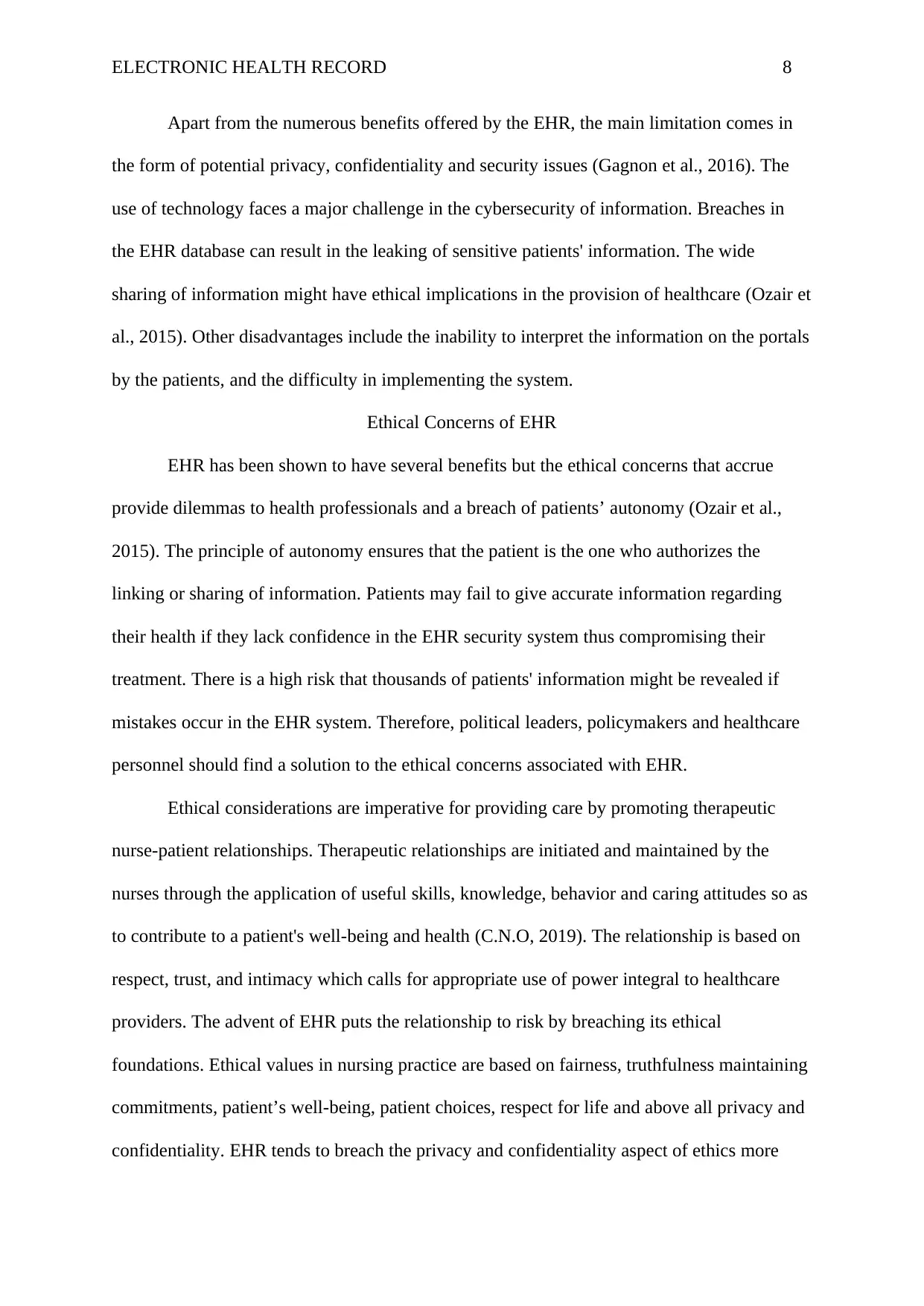
ELECTRONIC HEALTH RECORD 8
Apart from the numerous benefits offered by the EHR, the main limitation comes in
the form of potential privacy, confidentiality and security issues (Gagnon et al., 2016). The
use of technology faces a major challenge in the cybersecurity of information. Breaches in
the EHR database can result in the leaking of sensitive patients' information. The wide
sharing of information might have ethical implications in the provision of healthcare (Ozair et
al., 2015). Other disadvantages include the inability to interpret the information on the portals
by the patients, and the difficulty in implementing the system.
Ethical Concerns of EHR
EHR has been shown to have several benefits but the ethical concerns that accrue
provide dilemmas to health professionals and a breach of patients’ autonomy (Ozair et al.,
2015). The principle of autonomy ensures that the patient is the one who authorizes the
linking or sharing of information. Patients may fail to give accurate information regarding
their health if they lack confidence in the EHR security system thus compromising their
treatment. There is a high risk that thousands of patients' information might be revealed if
mistakes occur in the EHR system. Therefore, political leaders, policymakers and healthcare
personnel should find a solution to the ethical concerns associated with EHR.
Ethical considerations are imperative for providing care by promoting therapeutic
nurse-patient relationships. Therapeutic relationships are initiated and maintained by the
nurses through the application of useful skills, knowledge, behavior and caring attitudes so as
to contribute to a patient's well-being and health (C.N.O, 2019). The relationship is based on
respect, trust, and intimacy which calls for appropriate use of power integral to healthcare
providers. The advent of EHR puts the relationship to risk by breaching its ethical
foundations. Ethical values in nursing practice are based on fairness, truthfulness maintaining
commitments, patient’s well-being, patient choices, respect for life and above all privacy and
confidentiality. EHR tends to breach the privacy and confidentiality aspect of ethics more
Apart from the numerous benefits offered by the EHR, the main limitation comes in
the form of potential privacy, confidentiality and security issues (Gagnon et al., 2016). The
use of technology faces a major challenge in the cybersecurity of information. Breaches in
the EHR database can result in the leaking of sensitive patients' information. The wide
sharing of information might have ethical implications in the provision of healthcare (Ozair et
al., 2015). Other disadvantages include the inability to interpret the information on the portals
by the patients, and the difficulty in implementing the system.
Ethical Concerns of EHR
EHR has been shown to have several benefits but the ethical concerns that accrue
provide dilemmas to health professionals and a breach of patients’ autonomy (Ozair et al.,
2015). The principle of autonomy ensures that the patient is the one who authorizes the
linking or sharing of information. Patients may fail to give accurate information regarding
their health if they lack confidence in the EHR security system thus compromising their
treatment. There is a high risk that thousands of patients' information might be revealed if
mistakes occur in the EHR system. Therefore, political leaders, policymakers and healthcare
personnel should find a solution to the ethical concerns associated with EHR.
Ethical considerations are imperative for providing care by promoting therapeutic
nurse-patient relationships. Therapeutic relationships are initiated and maintained by the
nurses through the application of useful skills, knowledge, behavior and caring attitudes so as
to contribute to a patient's well-being and health (C.N.O, 2019). The relationship is based on
respect, trust, and intimacy which calls for appropriate use of power integral to healthcare
providers. The advent of EHR puts the relationship to risk by breaching its ethical
foundations. Ethical values in nursing practice are based on fairness, truthfulness maintaining
commitments, patient’s well-being, patient choices, respect for life and above all privacy and
confidentiality. EHR tends to breach the privacy and confidentiality aspect of ethics more
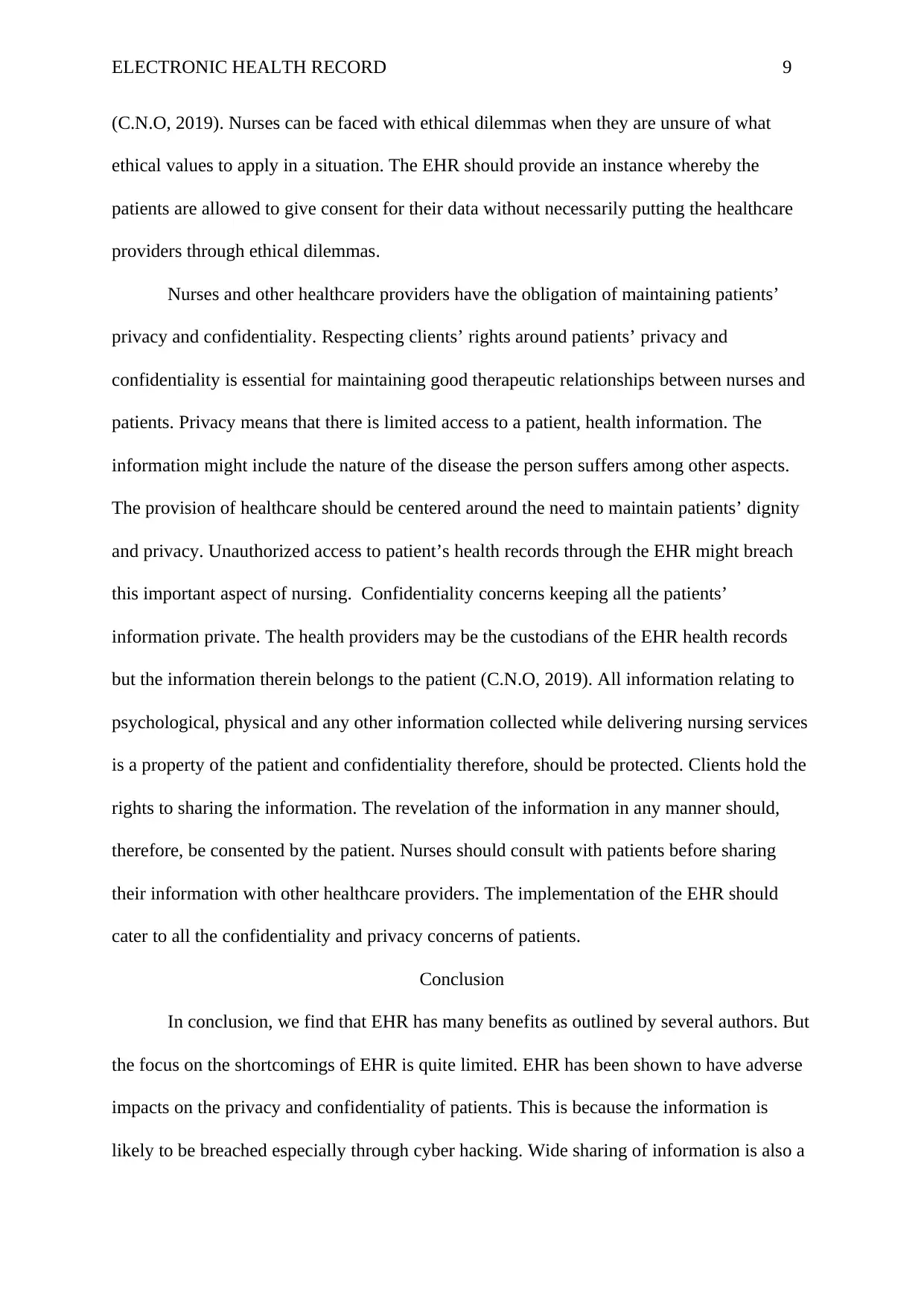
ELECTRONIC HEALTH RECORD 9
(C.N.O, 2019). Nurses can be faced with ethical dilemmas when they are unsure of what
ethical values to apply in a situation. The EHR should provide an instance whereby the
patients are allowed to give consent for their data without necessarily putting the healthcare
providers through ethical dilemmas.
Nurses and other healthcare providers have the obligation of maintaining patients’
privacy and confidentiality. Respecting clients’ rights around patients’ privacy and
confidentiality is essential for maintaining good therapeutic relationships between nurses and
patients. Privacy means that there is limited access to a patient, health information. The
information might include the nature of the disease the person suffers among other aspects.
The provision of healthcare should be centered around the need to maintain patients’ dignity
and privacy. Unauthorized access to patient’s health records through the EHR might breach
this important aspect of nursing. Confidentiality concerns keeping all the patients’
information private. The health providers may be the custodians of the EHR health records
but the information therein belongs to the patient (C.N.O, 2019). All information relating to
psychological, physical and any other information collected while delivering nursing services
is a property of the patient and confidentiality therefore, should be protected. Clients hold the
rights to sharing the information. The revelation of the information in any manner should,
therefore, be consented by the patient. Nurses should consult with patients before sharing
their information with other healthcare providers. The implementation of the EHR should
cater to all the confidentiality and privacy concerns of patients.
Conclusion
In conclusion, we find that EHR has many benefits as outlined by several authors. But
the focus on the shortcomings of EHR is quite limited. EHR has been shown to have adverse
impacts on the privacy and confidentiality of patients. This is because the information is
likely to be breached especially through cyber hacking. Wide sharing of information is also a
(C.N.O, 2019). Nurses can be faced with ethical dilemmas when they are unsure of what
ethical values to apply in a situation. The EHR should provide an instance whereby the
patients are allowed to give consent for their data without necessarily putting the healthcare
providers through ethical dilemmas.
Nurses and other healthcare providers have the obligation of maintaining patients’
privacy and confidentiality. Respecting clients’ rights around patients’ privacy and
confidentiality is essential for maintaining good therapeutic relationships between nurses and
patients. Privacy means that there is limited access to a patient, health information. The
information might include the nature of the disease the person suffers among other aspects.
The provision of healthcare should be centered around the need to maintain patients’ dignity
and privacy. Unauthorized access to patient’s health records through the EHR might breach
this important aspect of nursing. Confidentiality concerns keeping all the patients’
information private. The health providers may be the custodians of the EHR health records
but the information therein belongs to the patient (C.N.O, 2019). All information relating to
psychological, physical and any other information collected while delivering nursing services
is a property of the patient and confidentiality therefore, should be protected. Clients hold the
rights to sharing the information. The revelation of the information in any manner should,
therefore, be consented by the patient. Nurses should consult with patients before sharing
their information with other healthcare providers. The implementation of the EHR should
cater to all the confidentiality and privacy concerns of patients.
Conclusion
In conclusion, we find that EHR has many benefits as outlined by several authors. But
the focus on the shortcomings of EHR is quite limited. EHR has been shown to have adverse
impacts on the privacy and confidentiality of patients. This is because the information is
likely to be breached especially through cyber hacking. Wide sharing of information is also a
⊘ This is a preview!⊘
Do you want full access?
Subscribe today to unlock all pages.

Trusted by 1+ million students worldwide
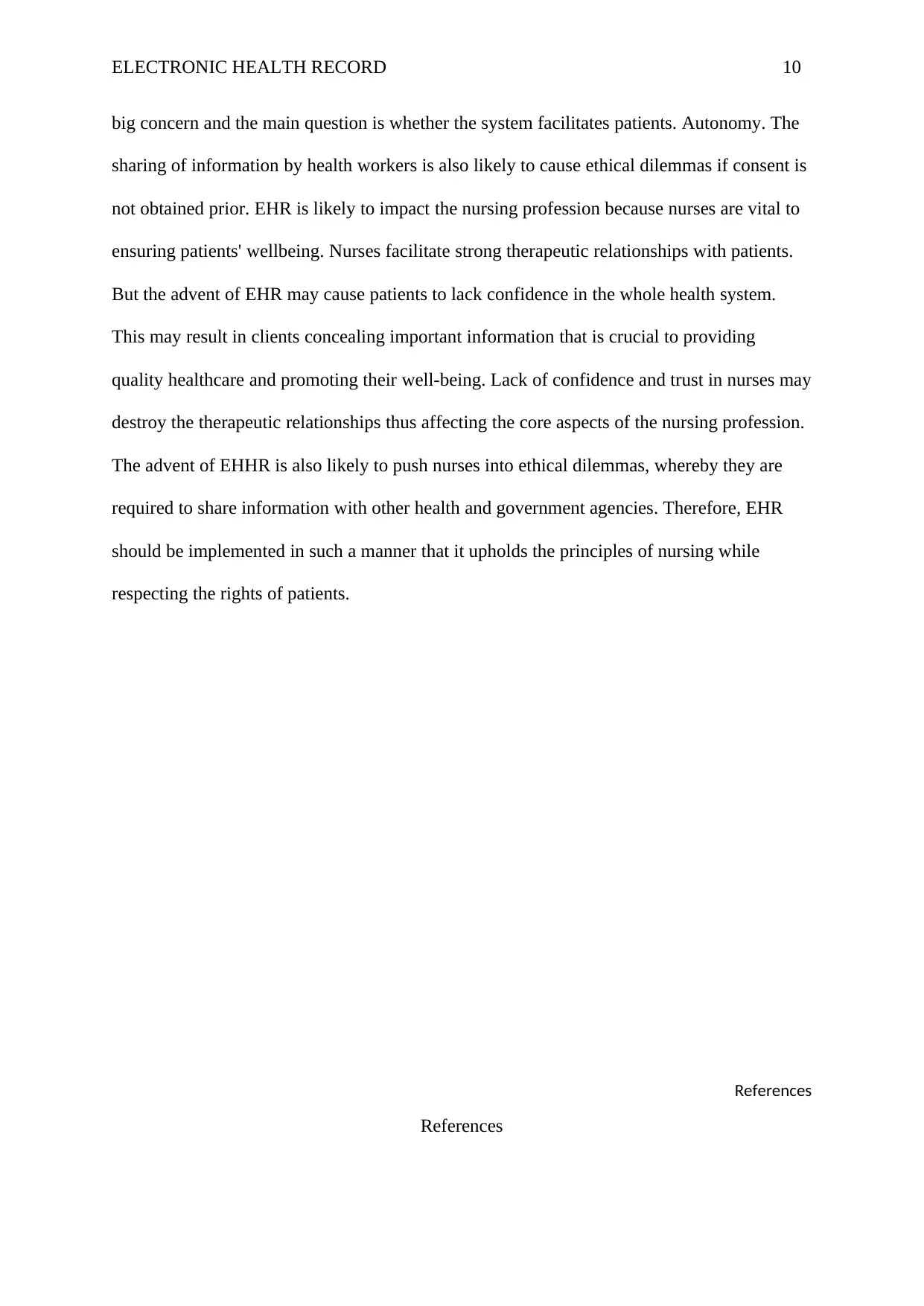
ELECTRONIC HEALTH RECORD 10
big concern and the main question is whether the system facilitates patients. Autonomy. The
sharing of information by health workers is also likely to cause ethical dilemmas if consent is
not obtained prior. EHR is likely to impact the nursing profession because nurses are vital to
ensuring patients' wellbeing. Nurses facilitate strong therapeutic relationships with patients.
But the advent of EHR may cause patients to lack confidence in the whole health system.
This may result in clients concealing important information that is crucial to providing
quality healthcare and promoting their well-being. Lack of confidence and trust in nurses may
destroy the therapeutic relationships thus affecting the core aspects of the nursing profession.
The advent of EHHR is also likely to push nurses into ethical dilemmas, whereby they are
required to share information with other health and government agencies. Therefore, EHR
should be implemented in such a manner that it upholds the principles of nursing while
respecting the rights of patients.
References
References
big concern and the main question is whether the system facilitates patients. Autonomy. The
sharing of information by health workers is also likely to cause ethical dilemmas if consent is
not obtained prior. EHR is likely to impact the nursing profession because nurses are vital to
ensuring patients' wellbeing. Nurses facilitate strong therapeutic relationships with patients.
But the advent of EHR may cause patients to lack confidence in the whole health system.
This may result in clients concealing important information that is crucial to providing
quality healthcare and promoting their well-being. Lack of confidence and trust in nurses may
destroy the therapeutic relationships thus affecting the core aspects of the nursing profession.
The advent of EHHR is also likely to push nurses into ethical dilemmas, whereby they are
required to share information with other health and government agencies. Therefore, EHR
should be implemented in such a manner that it upholds the principles of nursing while
respecting the rights of patients.
References
References
Paraphrase This Document
Need a fresh take? Get an instant paraphrase of this document with our AI Paraphraser
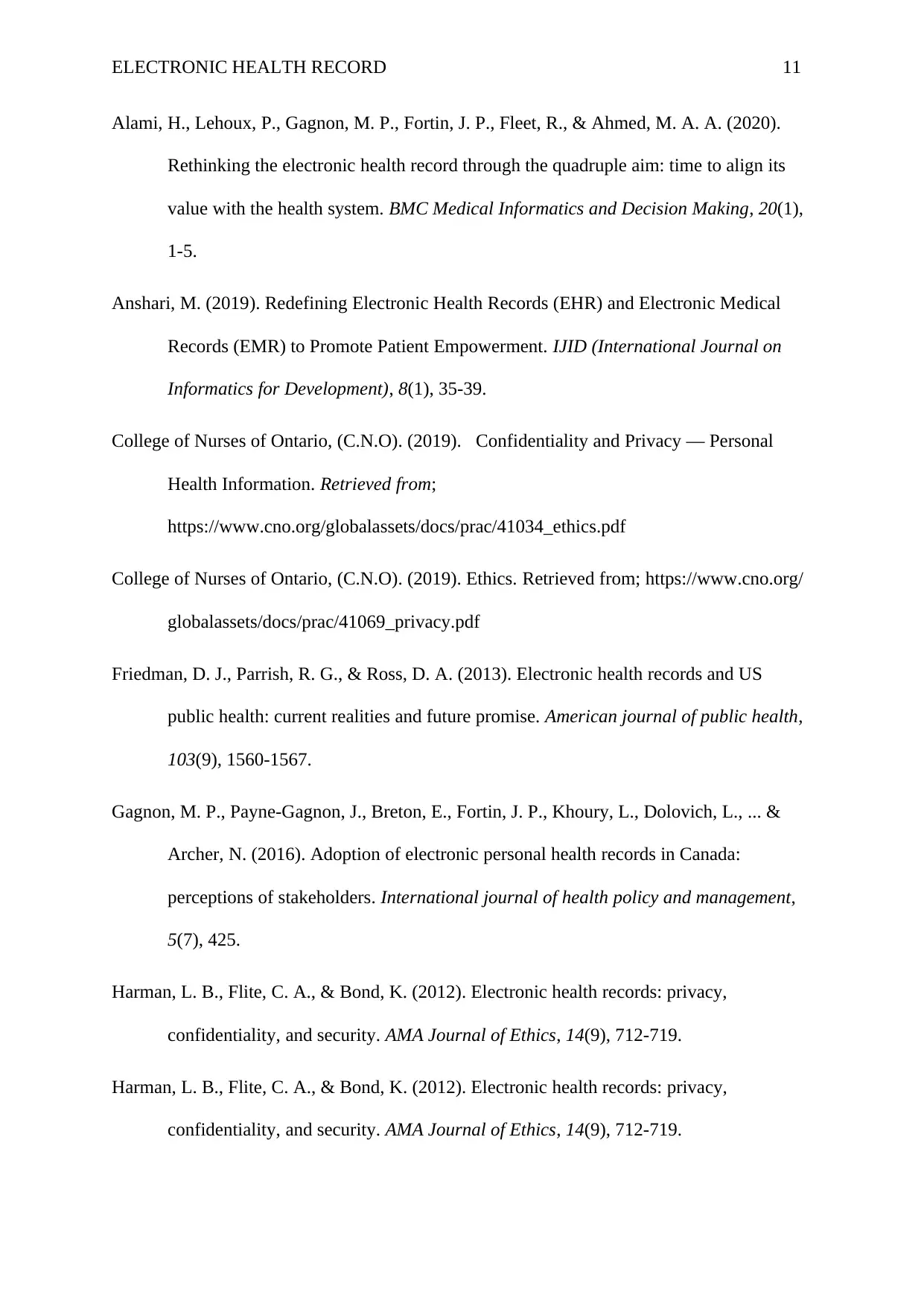
ELECTRONIC HEALTH RECORD 11
Alami, H., Lehoux, P., Gagnon, M. P., Fortin, J. P., Fleet, R., & Ahmed, M. A. A. (2020).
Rethinking the electronic health record through the quadruple aim: time to align its
value with the health system. BMC Medical Informatics and Decision Making, 20(1),
1-5.
Anshari, M. (2019). Redefining Electronic Health Records (EHR) and Electronic Medical
Records (EMR) to Promote Patient Empowerment. IJID (International Journal on
Informatics for Development), 8(1), 35-39.
College of Nurses of Ontario, (C.N.O). (2019). Confidentiality and Privacy — Personal
Health Information. Retrieved from;
https://www.cno.org/globalassets/docs/prac/41034_ethics.pdf
College of Nurses of Ontario, (C.N.O). (2019). Ethics. Retrieved from; https://www.cno.org/
globalassets/docs/prac/41069_privacy.pdf
Friedman, D. J., Parrish, R. G., & Ross, D. A. (2013). Electronic health records and US
public health: current realities and future promise. American journal of public health,
103(9), 1560-1567.
Gagnon, M. P., Payne-Gagnon, J., Breton, E., Fortin, J. P., Khoury, L., Dolovich, L., ... &
Archer, N. (2016). Adoption of electronic personal health records in Canada:
perceptions of stakeholders. International journal of health policy and management,
5(7), 425.
Harman, L. B., Flite, C. A., & Bond, K. (2012). Electronic health records: privacy,
confidentiality, and security. AMA Journal of Ethics, 14(9), 712-719.
Harman, L. B., Flite, C. A., & Bond, K. (2012). Electronic health records: privacy,
confidentiality, and security. AMA Journal of Ethics, 14(9), 712-719.
Alami, H., Lehoux, P., Gagnon, M. P., Fortin, J. P., Fleet, R., & Ahmed, M. A. A. (2020).
Rethinking the electronic health record through the quadruple aim: time to align its
value with the health system. BMC Medical Informatics and Decision Making, 20(1),
1-5.
Anshari, M. (2019). Redefining Electronic Health Records (EHR) and Electronic Medical
Records (EMR) to Promote Patient Empowerment. IJID (International Journal on
Informatics for Development), 8(1), 35-39.
College of Nurses of Ontario, (C.N.O). (2019). Confidentiality and Privacy — Personal
Health Information. Retrieved from;
https://www.cno.org/globalassets/docs/prac/41034_ethics.pdf
College of Nurses of Ontario, (C.N.O). (2019). Ethics. Retrieved from; https://www.cno.org/
globalassets/docs/prac/41069_privacy.pdf
Friedman, D. J., Parrish, R. G., & Ross, D. A. (2013). Electronic health records and US
public health: current realities and future promise. American journal of public health,
103(9), 1560-1567.
Gagnon, M. P., Payne-Gagnon, J., Breton, E., Fortin, J. P., Khoury, L., Dolovich, L., ... &
Archer, N. (2016). Adoption of electronic personal health records in Canada:
perceptions of stakeholders. International journal of health policy and management,
5(7), 425.
Harman, L. B., Flite, C. A., & Bond, K. (2012). Electronic health records: privacy,
confidentiality, and security. AMA Journal of Ethics, 14(9), 712-719.
Harman, L. B., Flite, C. A., & Bond, K. (2012). Electronic health records: privacy,
confidentiality, and security. AMA Journal of Ethics, 14(9), 712-719.
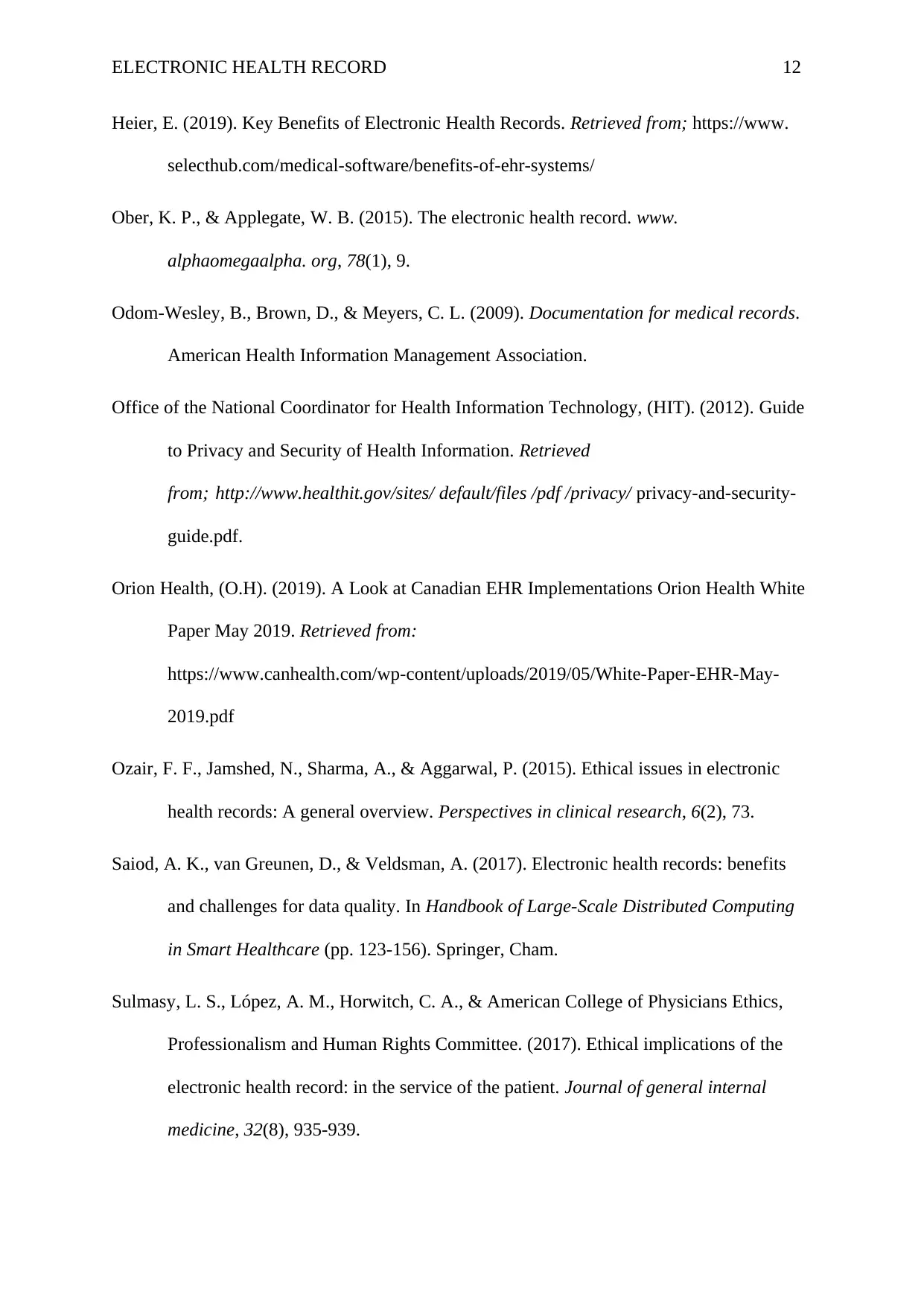
ELECTRONIC HEALTH RECORD 12
Heier, E. (2019). Key Benefits of Electronic Health Records. Retrieved from; https://www.
selecthub.com/medical-software/benefits-of-ehr-systems/
Ober, K. P., & Applegate, W. B. (2015). The electronic health record. www.
alphaomegaalpha. org, 78(1), 9.
Odom-Wesley, B., Brown, D., & Meyers, C. L. (2009). Documentation for medical records.
American Health Information Management Association.
Office of the National Coordinator for Health Information Technology, (HIT). (2012). Guide
to Privacy and Security of Health Information. Retrieved
from; http://www.healthit.gov/sites/ default/files /pdf /privacy/ privacy-and-security-
guide.pdf.
Orion Health, (O.H). (2019). A Look at Canadian EHR Implementations Orion Health White
Paper May 2019. Retrieved from:
https://www.canhealth.com/wp-content/uploads/2019/05/White-Paper-EHR-May-
2019.pdf
Ozair, F. F., Jamshed, N., Sharma, A., & Aggarwal, P. (2015). Ethical issues in electronic
health records: A general overview. Perspectives in clinical research, 6(2), 73.
Saiod, A. K., van Greunen, D., & Veldsman, A. (2017). Electronic health records: benefits
and challenges for data quality. In Handbook of Large-Scale Distributed Computing
in Smart Healthcare (pp. 123-156). Springer, Cham.
Sulmasy, L. S., López, A. M., Horwitch, C. A., & American College of Physicians Ethics,
Professionalism and Human Rights Committee. (2017). Ethical implications of the
electronic health record: in the service of the patient. Journal of general internal
medicine, 32(8), 935-939.
Heier, E. (2019). Key Benefits of Electronic Health Records. Retrieved from; https://www.
selecthub.com/medical-software/benefits-of-ehr-systems/
Ober, K. P., & Applegate, W. B. (2015). The electronic health record. www.
alphaomegaalpha. org, 78(1), 9.
Odom-Wesley, B., Brown, D., & Meyers, C. L. (2009). Documentation for medical records.
American Health Information Management Association.
Office of the National Coordinator for Health Information Technology, (HIT). (2012). Guide
to Privacy and Security of Health Information. Retrieved
from; http://www.healthit.gov/sites/ default/files /pdf /privacy/ privacy-and-security-
guide.pdf.
Orion Health, (O.H). (2019). A Look at Canadian EHR Implementations Orion Health White
Paper May 2019. Retrieved from:
https://www.canhealth.com/wp-content/uploads/2019/05/White-Paper-EHR-May-
2019.pdf
Ozair, F. F., Jamshed, N., Sharma, A., & Aggarwal, P. (2015). Ethical issues in electronic
health records: A general overview. Perspectives in clinical research, 6(2), 73.
Saiod, A. K., van Greunen, D., & Veldsman, A. (2017). Electronic health records: benefits
and challenges for data quality. In Handbook of Large-Scale Distributed Computing
in Smart Healthcare (pp. 123-156). Springer, Cham.
Sulmasy, L. S., López, A. M., Horwitch, C. A., & American College of Physicians Ethics,
Professionalism and Human Rights Committee. (2017). Ethical implications of the
electronic health record: in the service of the patient. Journal of general internal
medicine, 32(8), 935-939.
⊘ This is a preview!⊘
Do you want full access?
Subscribe today to unlock all pages.

Trusted by 1+ million students worldwide
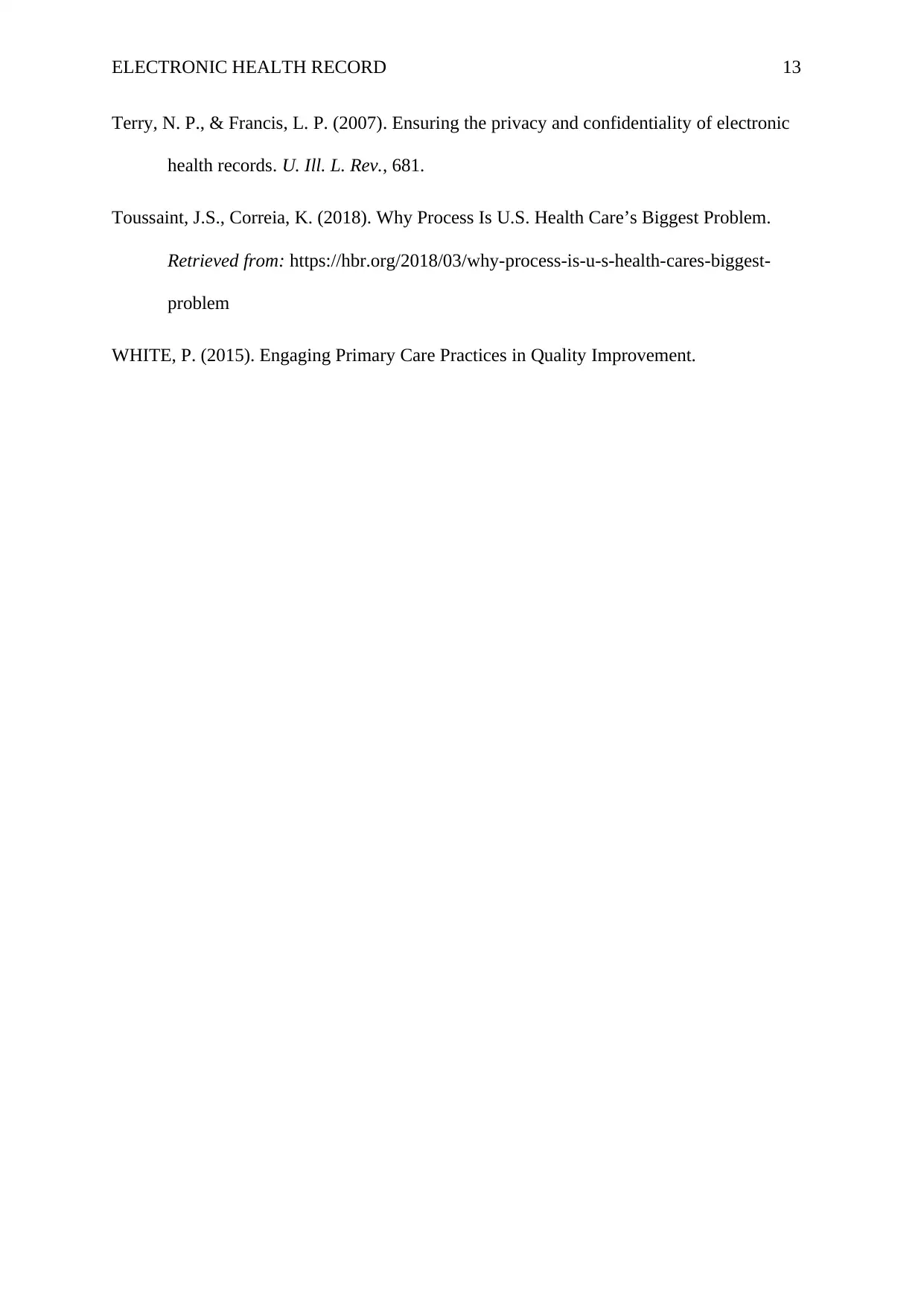
ELECTRONIC HEALTH RECORD 13
Terry, N. P., & Francis, L. P. (2007). Ensuring the privacy and confidentiality of electronic
health records. U. Ill. L. Rev., 681.
Toussaint, J.S., Correia, K. (2018). Why Process Is U.S. Health Care’s Biggest Problem.
Retrieved from: https://hbr.org/2018/03/why-process-is-u-s-health-cares-biggest-
problem
WHITE, P. (2015). Engaging Primary Care Practices in Quality Improvement.
Terry, N. P., & Francis, L. P. (2007). Ensuring the privacy and confidentiality of electronic
health records. U. Ill. L. Rev., 681.
Toussaint, J.S., Correia, K. (2018). Why Process Is U.S. Health Care’s Biggest Problem.
Retrieved from: https://hbr.org/2018/03/why-process-is-u-s-health-cares-biggest-
problem
WHITE, P. (2015). Engaging Primary Care Practices in Quality Improvement.
1 out of 13
Related Documents
Your All-in-One AI-Powered Toolkit for Academic Success.
+13062052269
info@desklib.com
Available 24*7 on WhatsApp / Email
![[object Object]](/_next/static/media/star-bottom.7253800d.svg)
Unlock your academic potential
© 2024 | Zucol Services PVT LTD | All rights reserved.




